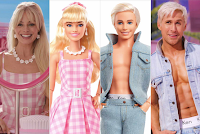Barbie is confused. Ken is insecure. But the really weird thing is that Barbie is self-aware. I’ll get back to that.
If this film had to be made (and over a billion dollars in box office receipts indicates, yes it did) Margot Robbie and Ryan Gosling were great casting decisions. They were both injection-molded in real life as Hollywood stars that seem flawless, from Ryan’s abs to Margot’s, well, everything. I dare you to find a blemish on either face.
They’re both perfect as the original incarnations of the Mattel toys. Then came…the other ones. You know, Beach Barbie, Doctor Barbie, Astronaut Barbie, President Barbie, Mermaid Barbie…and Ken. The first point made in the film is that Ken is nothing without Barbie. He’s more or less an accessory, off to one side and at the bottom of the toy box.
I don’t think it’s spoiling anything to reveal that Barbie, after suddenly dreaming of death (to the great horror of other Barbies) enters the real world in an apparent coming-of-age quest for purpose.
There’s even a Weird Barbie, well-played by Kate McKinnon. In an appropriately weird exchange, human Barbie proclaims, “I’m not pretty anymore. I’m not ‘stereotypical Barbie pretty.” Then, narrator Helen Mirren says to the audience, “Note to the filmmakers: Margot Robbie is the wrong person to cast if you want to make this point.” There’s an uncomfortable pause as Robbie turns toward the camera and lets this sink in.
Fans are apparently in an uproar over this line that was voted the worst in the movie.
But they get over it, and Barbie continues her self-assessment, confronting Will Ferrell, CEO of Mattel. He tries to “put Barbie back in her box”—a transparent metaphor for her literal repackaging as the unaware doll. Ken then goes rogue and takes over Barbieland, and the two confess to gawking strangers that they lack genitals. Hardy har.
Barbie’s conundrum is a less-than-nuanced layered onion of conflicting wants, needs, and perceptions. By the end of the film, the audience should be feeling confused, but Barbie confidently struts into the office of her…I’m not going to spoil that one.
So what’s the message of this movie? Is there more than one? Perhaps therein lies its power. Like Barbie, it can be whatever you want it to be.
Barbie is too good to be real, but she wants to be real until she’s real.
Barbie can do anything. Women can do anything.
Ken is nothing without Barbie. Tear down the patriarchy!
Barbie is stressed by her own perfection, don’t expect her to do it all.
She wants to be Everywoman, just don’t demand it of her.
She wants to be pretty, but don’t objectify her.
Why can’t everything just be the way it used to be? Make Barbie great again.
Around and around we go, with little girls everywhere as beneficiaries or collateral damage. At some point, the Mattel greed machine determined that a superhuman role model was the way to empower and motivate generations of toy-loving impressionable children. Of course, they just wanted to make money. Did they really care about empowerment, feminism, diversity, and inclusion?
So, best not to overthink this one. People are having tons of fun with it, and that's what going to the movies should be all about.
I never played with a Barbie, Ken, or GI Joe, so I’m fairly mystified by the phenomenon this movie became. I played with Silly Putty. Silly me. Go see Oppenheimer. There won't be a Silly Putty movie.
Barbie (2023) runs 1 hour 54 minutes and is rated PG-13.
😎
If you like fiction and you're in the mood for over 50 short stories, please consider buying "Natural Selections," at Amazon.com.

Or if you'd prefer seventy non-fiction stories inspired by a town in Illinois, please consider buying Park Ridge Memories also on Amazon. Click on the image below.





